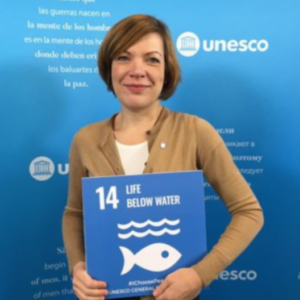The Ocean Acidification Research for Sustainability (OARS) Programme is urging individuals, organisations and governments for action in seven key areas.
Ocean Acidification – the ongoing decrease in ocean pH caused by human CO2 emissions, such as the burning of fossil fuels – is known to be having detrimental impacts on many important marine species including corals, shellfish and plankton. The consequences are globally recognized with the United Nations Sustainable Development Goals (SDG) including a target calling to ‘Minimize and address the impacts of ocean acidification, including through enhanced scientific cooperation at all levels’.
Building on the work of the Global Ocean Acidification Observing Network (GOA-ON) and the broader ocean acidification community, the Ocean Acidification Research for Sustainability (OARS) Programme, a UN Ocean Decade programme, has today (December 6) launched a new initiative, inviting anyone, from individuals to global entities, to submit a Commitment in one or more of seven key areas.
Launched to coincide with the UN Climate Change meeting COP28, in full the 28th Conference of the Parties (COP) to the United Nations Framework Convention on Climate Change (UNFCCC) – taking place in the United Arab Emirates (UAE) from 30th November to the 12th December – the Commitments are designed to improve the quality and sharing of data and the capabilities for observation and forecasting, while also fostering more collaboration and capacity-building at local and international level.
Individuals, organisations and government bodies are being invited to submit Commitments via the dedicated ‘Your OARS Commitment’ online portal. These will be shared with the ocean acidification community in order to build a better understanding of what action is being taken around the world, in turn supporting increased partnership working and identifying potential gaps.

“Across our planet, ocean acidification poses a real, and rapidly accelerating, threat to marine ecosystems and the people who depend on those ecosystems for their wellbeing and livelihoods. To meet this challenge, we all need to act, from individuals and small groups to large multi-national organisations and governments. By publicly committing your action to OARS you not only show your own intention to address the growing ocean acidification crisis, but you also inspire others to join you and identify their own contributions. Whatever you can contribute, no matter how small it may seem, every single action counts and we welcome you all to become a part of delivering the ambitions and outcomes of the OARS UN Ocean Decade programme.”
The seven key outcome areas which the Commitments will help to deliver are as follows:
- Quality data
The scientific community will provide ocean acidification data and evidence of known quality via capacity development, mentoring of early career researchers, facilitating data sharing, growing regional collaborations, and increased communication through meetings and workshops, allowing for a holistic analysis considering all stakeholder perspectives.
- Science to Action
Data and evidence needs for mitigation and adaptation strategies will be identified and prioritised, from local to global. These needs are communicated to the scientific and science policy community to ensure that science is prioritised.
- Observation strategies
Observation strategies are co-designed and implemented in collaboration with data/information producers and end-users. Factors limiting collection of data are identified and solutions are implemented. Observation strategies are proactively designed and implemented to ensure vulnerable areas are adequately monitored. Ocean acidification baseline information is available for newly developed carbon removal strategies.
- Biological Impacts
Ocean acidification impacts on marine organisms and ecosystems is better understood to protect marine life. Biological observation is implemented within ocean acidification monitoring, providing the possibility to improve predictions of vulnerability and resilience to ocean acidification at all temporal and spatial scales.
- Future Predictions
Appropriate, societally relevant predictions and projections of ocean acidification trends and impacts are available for all ocean ‘users’, employing new technologies such as digital twins, to support adaptation and mitigation actions and strategies.
- Public Awareness
The public are more informed about ocean acidification, its sources, and impacts, achieved via ocean literacy and public outreach.
- Policy Engagement
Strategies and solutions exist that enable countries and regions to include ocean acidification evidence in their respective policy and legislation.

“Reflecting on the vital role of the ocean to humans, the UN Ocean Decade offers a time to step up and engage such that we can make a difference to the future of how ocean acidification will play out. The UN-endorsed programme Ocean Acidification Research for Sustainability or OARS has identified seven outcomes, with pathways forward in each guided by community input, that collectively can illuminate and address impacts of ocean acidification. Now is the time to rally to see what you, what all of us, can do to help implement this effort.”

“Detecting ocean acidification is a first step, but in order to be able to combat its impacts we have to develop new strategies, addressing the causes, and ways to mitigate and adapt. Ocean acidification research co-developed by a variety of stakeholders is essential to safeguarding a thriving ocean—one that sustains livelihoods for billions. Join OARS and become part of a community as diverse as the solutions required for meaningful change.”
***
About OARS:
Aligned with Sustainable Development Goal Target 14.3, OARS is dedicated to minimising and addressing the impacts of Ocean Acidification (OA) through enhanced cooperation at all levels. The OARS programme aims to provide systematic evidence of the impacts of ocean acidification on the sustainability of marine ecosystems, enhance ocean acidification capacity, increase observations of ocean chemistry changes, enhance the communication to policy makers and communities by providing the information needed to mitigate and adapt to ocean acidification, and to facilitate the development and evaluation of strategies to offset future impacts.
For more information visit: Ocean Acidification Research for Sustainability Programme – Ocean Acidification Research for Sustainability Programme (oars-commitments.org)
What is Ocean Acidification?
Ocean acidification is a direct consequence of the increased concentration of CO2 in the atmosphere resulting from human activities such as the burning of fossil fuels. When excess CO2 is absorbed by the ocean, a series of chemical reactions occur, resulting in a decrease in pH levels. Although the ocean isn’t acidic, this change in pH towards a more acidic state disrupts the delicate balance that many marine organisms, like corals, shellfish, and some plankton. These organisms require a substance called calcium carbonate to build their shells and skeletons. Ocean acidification makes it harder for them to do this, which can harm their health and survival. This can have a ripple effect through the whole ocean ecosystem, affecting fish and other animals that depend on these creatures for food, as well as humans.
Ocean acidification jeopardises the delicate balance of marine life and the well-being of communities worldwide. OARS recognises the urgency of this challenge and emphasizes the pivotal role each entity, no matter the size, plays in addressing ocean acidification, before it becomes the seventh planetary boundary to be crossed.
To arrange an interview with Professor Steve Widdicombe, Professor Jan Newton or Dr. Kirsten Isensee please contact:
Amy Kenworthy (OARS Project Officer)
Ake@pml.ac.uk | +44(0)7538 281215